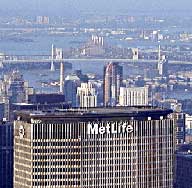|
|
[http://tlpj.org/left_nav_interior.htm]
|
Court Affirms Individual Right to Sue of Plaintiffs Who Opted Out of MetLife National Class Action Settlement TLPJís Objections Prompt Federal Magistrate Judge to Reverse Decision
In a major ruling affirming the rights of plaintiffs who opt out of class action settlements to pursue their own claims, a federal magistrate judge in the Western District of Pennsylvania dramatically reversed course and agreed with Trial Lawyers for Public Justice (TLPJ) that he erred in recommending on January 4, 2002, that plaintiffs who opted out of a national class action settlement with the Metropolitan Life Insurance Company (MetLife) should be barred from introducing key evidence in their individual cases against MetLife. U.S. Magistrate Judge Kenneth J. Benson wrote, "Wisdom, to paraphrase Justice Frankfurter, so often never comes that she ought not to be spurned just for coming late. On reconsideration, and in light of the arguments of the parties, I conclude the Report of January 4, 2002, was error." The reversal in In Re: Metropolitan Life Insurance Co. Sales Practices Litigation, issued August 15 and received by the parties on August 19, came after TLPJ filed objections to the magistrateís initial decision on behalf of 392 people who opted out of the national class action settlement to pursue their own suits for deceptive sales practices against MetLife. TLPJ successfully argued that the January 4 decision violated Rule 23 of the Federal Rules of Civil Procedure and was contrary to due process, the federal Anti-Injunction Act, and the express terms of the class action notice.
"We are pleased and relieved that the Court has seen the error of its original recommendation," said TLPJís Leslie Brueckner, who was the principal author of the objections for the opt-out litigants and argued the motion in federal court in Pittsburgh on February 28, 2002. "By courageously reversing his prior recommendation, Judge Benson has recognized and protected the rights of opt-out litigants embodied in both Rule 23 and the U.S. Constitution." TLPJís objections to the Magistrate Judgeís initial ruling emphasized, first, that the injunction would violate the plain terms of the class notice, which provided that class members who opted all of their claims out of the settlement "will not be bound . . . by any Orders or judgments entered in this case if the proposed settlement is approved." TLPJ further argued that the injunction would violate Rule 23 and the due process clause of the U. S. Constitution, both of which require a full and unfettered right to opt out of class actions seeking money damages. Finally, TLPJ emphasized that the injunction would violate the Anti-Injunction Act, which prohibits a federal court from enjoining proceedings in state court except where necessary to protect the federal courtís jurisdiction or to prevent relitigation of claims. TLPJ argued that neither exception was applicable here, because the opt-out litigantsí cases do not in any way threaten to disrupt the federal courtís jurisdiction over the underlying settlement (which has long since been concluded) and do not involve the relitigation of any claims, since the opt-out litigants opted all of their policies out of the nationwide settlement. On August 15, Magistrate Benson agreed. "These respondents opted out of the MetLife settlement," he wrote. "They had the right to do so. To permit the settlement and release to vest a right in MetLife that it can assert against non-settling plaintiffs... deprives them of the benefit of having opted out. [It would also] convert this Rule 23(b)(3) class action into something it is not, and something MetLife has never suggested it is: a mandatory class action." "This is an extremely important ruling," said TLPJís Michael Quirk, who co-authored the objections. "Our clients opted all of their claims out of the nationwide settlement. If the Court had granted the injunction MetLife wanted, it would have rendered the opt-out right almost completely meaningless." Magistrate Judge Benson retired from the federal bench on the same day that he issued his August 15 reversal. MetLife has until August 22, 2002, to file objections to Judge Bensonís new decision. A final ruling on the recommendation will ultimately be made by U.S. District Court Judge Donetta Ambrose, who is presiding over the case. TLPJís objections were filed as part of its Class Action Abuse Prevention Project, a nationwide campaign dedicated to monitoring, exposing, and fighting class action abuse nationwide. In addition to Brueckner and Quirk, the legal team on the case included TLPJ Executive Director Arthur H. Bryant and Kenneth R. Behrend, Jr., of Pittsburgh, Pennsylvania, who represents the 392 opt-out litigants in their 255 individual cases against MetLife. Copies of TLPJís briefs and a copy of the August 15 report and recommendation in In Re: Metropolitan Life Insurance Sales Practices Litigation are available at TLPJís web site, www.tlpj.org. ### Trial Lawyers for Public Justice is
the only public interest law firm dedicated to using trial lawyersí
skills and resources to advance the public good. Founded in 1982,
TLPJ utilizes a network of more than 2,700 of the nationís
outstanding trial lawyers to pursue precedent-setting and socially
significant litigation. TLPJ has a wide-ranging litigation docket in
the areas of consumer rights, worker safety, civil rights and
liberties, toxic torts, environmental protection, and access to the
courts. TLPJ is the principal project of The TLPJ Foundation, a
not-for-profit membership organization headquartered in Washington,
D.C., with a West Coast office in Oakland, California. The TLPJ web
site address is www.tlpj.org.
TLPJís Pennsylvania State Coordinator is Bernard W. Smalley, Sr.,
tel. 215-735-3864. |
 View
of MetLife's headquarters in New York as seen from the
Empire State Building.
View
of MetLife's headquarters in New York as seen from the
Empire State Building. Leslie Brueckner
Leslie Brueckner